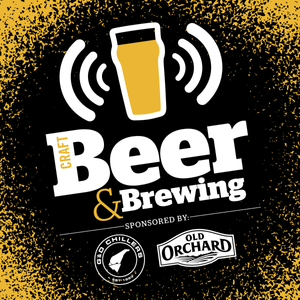
#8: "Empowerment": The New Colonialism Trap
11/25/19 • 18 min
I want to start by thanking everyone who has reached out to me and sent questions/comments or just let me know that you enjoy listening. I started this podcast as my offering to chip away at the knowledge gap between coffee producers and consumers
In today’s podcast episode we’re going to hear from 2 sides of the value chain in very different parts of the world. Brendan from Semilla Roasters in Canada gives the roaster perspective and later in the episode we hear from Vivek, a 4th generation coffee producer in India. He asks for advice because he’s unsure where to start. Can he learn to be a good cupper without having a Q grader license?
To me, the gap is an issue because it determines power dynamics. The simple issue is:
Producers who don’t cup their coffee don't have the power to improve their coffee.
It’s an obvious statement but one that is frequently overlooked because it’s been the standard. Producers often rely on external parties to tell them this vital information. The buyer who is able to cup the coffees is the one who can determine the value.
This alone is bad enough but I’ve seen it lead to a new disturbing trend.
Since the buyers are generally more knowledgeable about the coffee’s quality and since they cup more than producers do, they are uniquely in a position to tell producers how to improve or change their coffee.
Regardless of the good intentions, the buyer is dictating terms, the buyers is still the expert, the buyer has more knowledge, the buyer has more power.
And I couldn’t leave this topic without talking about the word “empower”
I was guilty of using this word to describe my work. It used to be part of my mission statement to “empower producers with unconventional practices”. I had that written on my profile and website.
But as I discuss in this episode, that word now makes me feel uncomfortable and I’ve removed it from my website and avoid using it.
After listening to today's episode, I hope you’ll consider avoiding it also.
Resources Mentioned in this episode:
All Beans Considered: http://allbeansconsidered.com/
Coffee Quality Institute: https://www.coffeeinstitute.org/
Luxia Presentations: https://www.luxia.coffee/instructional-videos
I want to start by thanking everyone who has reached out to me and sent questions/comments or just let me know that you enjoy listening. I started this podcast as my offering to chip away at the knowledge gap between coffee producers and consumers
In today’s podcast episode we’re going to hear from 2 sides of the value chain in very different parts of the world. Brendan from Semilla Roasters in Canada gives the roaster perspective and later in the episode we hear from Vivek, a 4th generation coffee producer in India. He asks for advice because he’s unsure where to start. Can he learn to be a good cupper without having a Q grader license?
To me, the gap is an issue because it determines power dynamics. The simple issue is:
Producers who don’t cup their coffee don't have the power to improve their coffee.
It’s an obvious statement but one that is frequently overlooked because it’s been the standard. Producers often rely on external parties to tell them this vital information. The buyer who is able to cup the coffees is the one who can determine the value.
This alone is bad enough but I’ve seen it lead to a new disturbing trend.
Since the buyers are generally more knowledgeable about the coffee’s quality and since they cup more than producers do, they are uniquely in a position to tell producers how to improve or change their coffee.
Regardless of the good intentions, the buyer is dictating terms, the buyers is still the expert, the buyer has more knowledge, the buyer has more power.
And I couldn’t leave this topic without talking about the word “empower”
I was guilty of using this word to describe my work. It used to be part of my mission statement to “empower producers with unconventional practices”. I had that written on my profile and website.
But as I discuss in this episode, that word now makes me feel uncomfortable and I’ve removed it from my website and avoid using it.
After listening to today's episode, I hope you’ll consider avoiding it also.
Resources Mentioned in this episode:
All Beans Considered: http://allbeansconsidered.com/
Coffee Quality Institute: https://www.coffeeinstitute.org/
Luxia Presentations: https://www.luxia.coffee/instructional-videos
Previous Episode

#7: Coffee Travel: Helping or Hurting?
I’m writing this from a hotel in the small town of Ataco, El Salvador. I’ve been away from home for 21 days out what will eventually be 120.
It’s currently coffee harvest time in Central America this is the time of the year when I am traveling the most seeing clients at their mills and designing fermentation lots.
This is an interesting industry because of the amount of travel required by many parties along the chain (farmers, producers, exporter, importers, roasters and cafes). All of these entities are usually located in different countries with different languages, time zones, cultures and customs. These far apart business need to work together and the best way to have a smooth business is to have strong relationships. The best way I can think of to have strong relationships is to travel and sit with each other face to face and get to know the other's culture.
Unfortunately flying is a huge contributor of carbon emissions.
I’ve struggled with the paradox since I started traveling heavily in 2014.
At home, I am committed to reducing my environmental impact, I don’t have a car, I buy bulk foods in my own reusable containers, I compost all my food waste, Ive reduced my meat consumptions and I’ve stopped purchasing new clothes. Yet the amount of flying I do every year eclipses all the other efforts.
Previous years I spent November to March alternating one week in Central America and one week at home. Sometimes even seeing 3 clients in 1 month and only being home for a handful of days.
In addition to the environmental strain, there was a personal strain as well. That pace was difficult because It kept me constantly on the move and in airports, I was never home long enough to feel refreshed.
There was a moment I felt like I might need to quit working in coffee because the travel was too demanding.
To reduce my travel, this year I’m trying something different. Instead of going back and forth between Central America and the United States, I will stay in Central America all 4 months. My flying is dramatically reduced but not eliminated. Having such a dramatic carbon footprint is not in alignment with how I live the rest of my life, so I’m still working on how to reconcile that.
Join me for today’s episode for more on this paradox and a harvest update.
Next Episode

#9: Doubling Down in El Salvador with Jan Carlo of Mapache
In this episode, I had the chance to speak with Jan-Carlo Handtke of Mapache Coffee.
Jan-Carlo shares important perspectives of what it's like to be a 5th generation producer today. When most people are leaving coffee, Jan-Carlo and his wife Sofia are doubling down, buying new farms and making significant investments in education and equipment.
In this conversation we talk about the role of social media, selling coffee on the local market, and he also shares some of his struggles. We talk about coffee farm irrigation, his Q-grader story, shade trees, and so much more.
If you like this episode you’ll love
Episode Comments
Generate a badge
Get a badge for your website that links back to this episode
<a href="https://goodpods.com/podcasts/making-coffee-with-lucia-solis-218136/8-empowerment-the-new-colonialism-trap-24702090"> <img src="https://storage.googleapis.com/goodpods-images-bucket/badges/generic-badge-1.svg" alt="listen to #8: "empowerment": the new colonialism trap on goodpods" style="width: 225px" /> </a>
Copy




